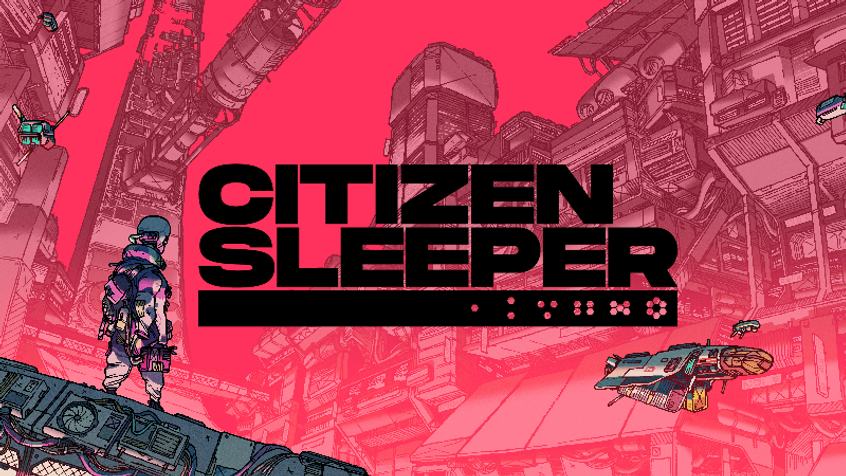Citizen Sleeper
I am a law student, currently studying technology law and hoping to someday regulate the tech industry. I do this because I, more than most people, have seen enough of the inside of the tech industry to understand the power it has, the power it currently wields, and the power we continuously cede to it without realising what hold we are granting. I want to be part of the faceless bureaucracy monitoring the endless march of technology because I believe it needs to be watched, and not doing so is inviting a deeper dystopia.
I bring this up because the story Citizen Sleeper tells is not just the surface level story of trying to survive on a decaying station, but one of the intersection of technology, capitalism, and our very conception of humanity. It’s a game that asks us to consider what it means to be human, what it means to consume, and what the future of technology actually is and how it interacts with the first two considerations.
It is, in essence, the perfect game for me to just get lost in.
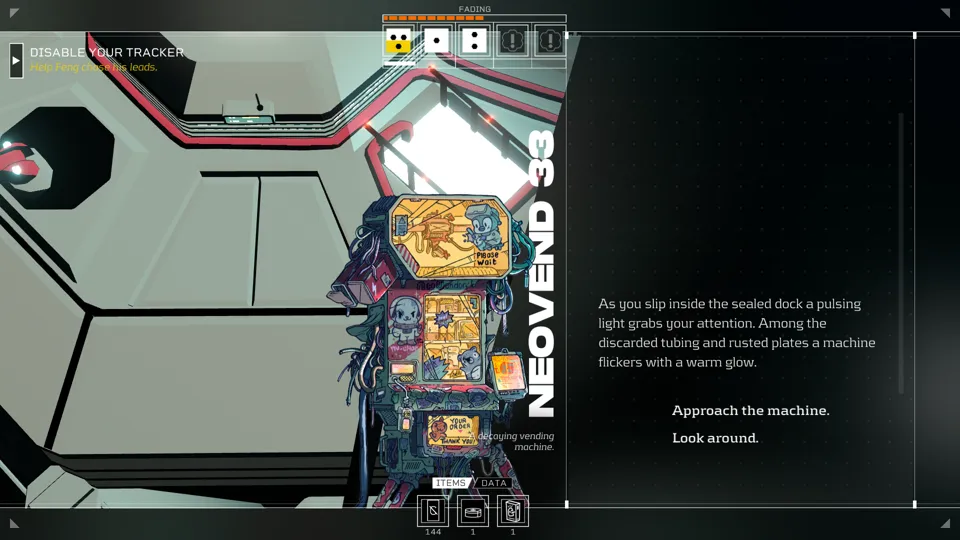 I
feel like the talking vending machine is a stock cyberpunk character at this
point.
I
feel like the talking vending machine is a stock cyberpunk character at this
point.
Citizen Sleeper follows the story of the titular Sleeper, an android with a “human” consciousness who fled to a space station to escape slavery. The Sleeper is now faced with the harsh reality of survival, and of navigating an unfamiliar and occasionally unfriendly space, while also learning to make friends, to trust, and to become who they choose to be along the way.
Citizen Sleeper is difficult to place in any particular genre. It has some survival elements, though these are light and fade away by the mid game. It veers close to a visual novel, though it has more interactivity and player agency than I would ascribe to a visual novel. Even though it has some degree of character customisation, it’s not quite an RPG either. It is, much like its main character, a blending of a variety elements into something wholly new and intriguing. The game’s mechanics are similarly unique. The player has a set of dice that they can invest in actions, though how they choose to invest these, and the risks they choose to accept in doing so are wholly up to them. Indeed, the dice themselves are not the point. They are a vehicle to get to the story, and to see how the world around the Sleeper plays out.
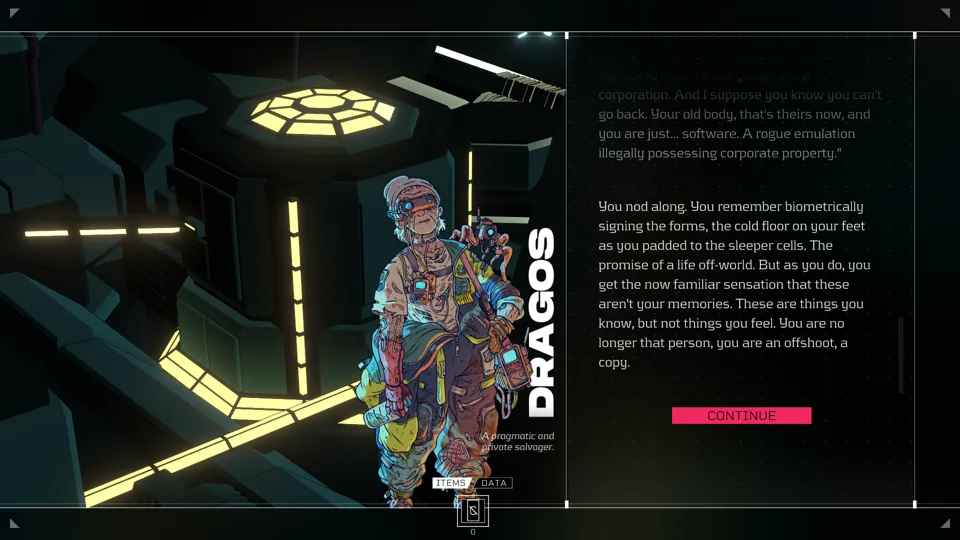 We
start off the discussions about humanity early.
We
start off the discussions about humanity early.
The story of Citizen Sleeper is one of survival, but not necessarily exclusively in a physical sense. While there are initial survival elements, these become easy to overcome, to the point where I was flush with every resource I could ever need, except time. Time became the sole limiter of what I could do, what I could accomplish, and what crises I would actually solve. Survival became not a question of survival of the physical, but of deciding how best to use the time allotted to me to do what I saw as most meaningful. In a sense, Citizen Sleeper became a mirror of the fundamental human experience - to make the most of the time given, knowing that it is finite.
There’s an irony to this being expressed in Citizen Sleeper. The player character is a Sleeper, an artificial body infused with a human consciousness, giving it the durability of an android, but the mental flexibility of a human. The corporate entity that created this particular Sleeper made some modifications to the mind - very few of the original human’s memories survive, for instance - though what those modifications are isn’t entirely known. That mind can be duplicated and placed into any number of bodies, rendering the mind as a whole immortal, even if any given iteration of it is not. The concern of time and making of it what we can isn’t one that necessarily matters to this mind, though it does very much matter to this particular Sleeper. This Sleeper seeks survival, though what form that survival takes is up to the player and the choices they make along the way.
One of the themes of the game is that exploration of humanity, and what actually defines humanity. One of the prevailing questions undergirding the game is that question of whether the Sleeper can ever truly be human, or if that’s even something the Sleeper wants to be. While there are multiple endings, how the player understands the humanity of each is entirely depending on a foundational understanding of what it actually means to be human in the first place.
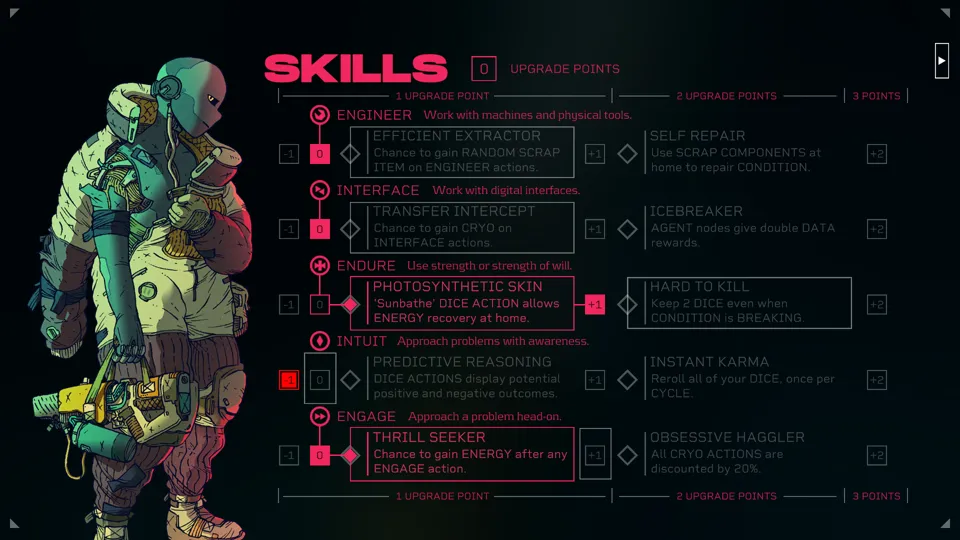 My
Sleeper is named Lunk.
My
Sleeper is named Lunk.
The idea of uploading consciousnesses isn’t a new idea. It’s existed in science fiction for decades, and for some, is seen as increasingly within reach in reality as well. It’s often coupled with the idea of immortality, that, with a consciousness uploaded, an uploaded person is effectively immortal, as they are no longer reliant on their body for survival. For some, then, the idea of uploading a consciousness is an enticing one. It provides the ability to overcome the physical, to be the ultimate expression of mind over matter, to move beyond one of the most fundamental aspects of humanity and become something more. Digital immortality represents the ultimate expression of transhumanism, and the potential of humanity to move beyond our earthly shells.
This is an optimistic vision of the potential of consciousness uploading, and one that I think already disregards a certain degree of the human reality. Uploaded consciousnesses are vulnerable. They are able to be tampered with, to be manipulated, to have done to them the same things we already do to any number of programs or simulations. To be disembodied is to be stripped of rights and protections, as our current body of laws and rights understand consciousness and humanity as requiring a body. In any world where the consciousness can be removed from the body, new laws and new conceptions of rights would need to be implemented. To do that, we would need to conceive of these digital consciousnesses as still being human. We would need to understand a copy as being as deserving of rights as an individual, or that something artificial can still be sentient. We already struggle with the idea that non-human animals are deserving of rights and protections - the idea that we would believe that a digital consciousness has any rights at all is a laughable one.
And that’s before considering the role of capitalism.
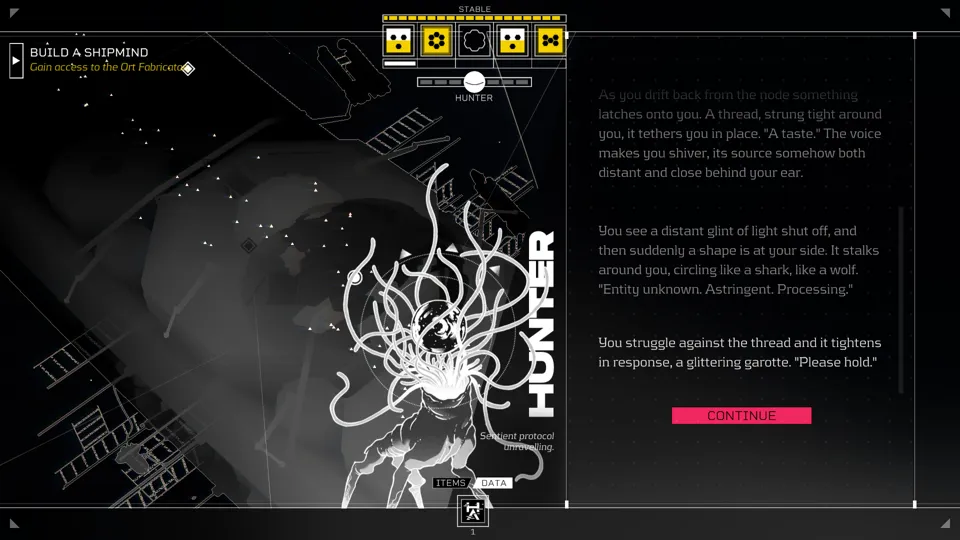 Ah,
yes. Customer service.
Ah,
yes. Customer service.
Citizen Sleeper examines all these questions of rights and laws and how humanity is viewed through a post-physical lens, but it takes the brilliant extra step of considering not just the role of morals and ethics, but how those are warped by capitalism.
Citizen Sleeper is a deeply anti-capitalist game. The game is set on a space station abandoned by corporate overlords when it became unprofitable to maintain, but whose existence is later threatened by a different set of new owners when they, again, view the station as unprofitable. Multiple characters tell their stories of engaging in employment in good faith, only to be chewed up and spat out by a system bent on profit at all cost. The Sleeper themselves is a consequence of the intersection of capitalism and technology. The Sleeper’s ur-human uploaded themselves for cash, analogous to how someone today might donate plasma. They condemned copies of their consciousness to slavery so they themselves could survive.
These ideas are presented through a science fiction lens, but they are not science fiction. Neighbourhoods, cities, or entire areas are decimated through the drive for profit. Amazon warehouses, digital sweatshops, and the endless sea of low-paid workers fed into the tech economy are stellar examples of how people are reduced to resources on a spreadsheet, to be disposed of without thought or consequence. We sell our bodies and our selves for survival, knowing in doing so, we are feeding the very system that seeks to destroy us, but continuing because we have no other choice. It is this or oblivion.
The dystopia of Citizen Sleeper is not because of capitalism - it is capitalism.
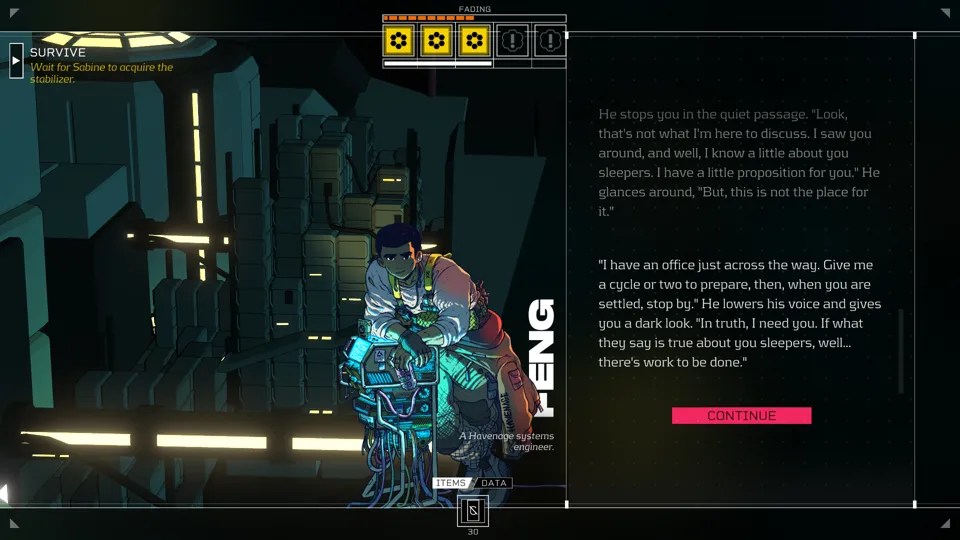 I
made a friend!
I
made a friend!
This is the story of Citizen Sleeper. It is a story that explores what it is to be human under capitalism. It frames this through the lens of a Sleeper deciding their own humanity for themselves, but it is also a journey experienced by the player. In playing through Citizen Sleeper, I thought a lot about my own experiences, and the choices I’ve made. There is no question in anyone’s mind that I’m human, but does that mean anything anymore? I am a writer, but I can’t write as quickly as ChatGPT or SEO optimise for Google’s algorithms, so my writing goes unseen. I’m a photographer, but Midjourney can craft entire worlds in seconds, using the images it’s stolen from me, so why would anyone look at the originals? When I browse the internet, the value I present to the sites I access is not my thoughts or interest - it’s my engagement, my data, my ability to give them what they need to craft algorithms that can better engage people like me. I give them my soul so they can, in return, try to sell me things that might, for a few brief moments, distract me from the knowledge that this cycle is destroying the planet.
We all have limited time. It’s how we choose to use that time that makes us who we are.
Capitalism, ultimately, does not want us to be human. It wants us to be cogs in the machine, simultaneously making, selling, and consuming the things we don’t need. Humanity as an expression of creativity, of emotion, of self, is worthless. We are our time, as long as that time is dedicated to the wheels of production. Otherwise, we are worthless.
Citizen Sleeper understands this truth, and acknowledges it while trying to offer some comfort. The Sleeper understands they’re worthless, but finds worth in their interactions with people and the world around them. They defy the mantra their corporate owners have ascribed to them through surviving and persisting, even when they have ceased to have value. Still, when their persistence is embodied in work and effort, it still raises the question of whether they’ve truly escaped, or if that need to be productive is so imprinted on their brain that they can only be that cog.
Maybe, then, the Sleeper truly is human, not because of their experiences or emotion, but because they are as trapped as everyone else around them. There is no escape, and the only comfort is the knowledge that someday, eventually
time
runs
out.
Developer: Jump Over The Age
Genre: Interactive Fiction, Indie
Year: 2022
Country: United Kingdom
Language: English
Play Time: 7-10 Hours
Youtube: https://youtu.be/JbPiFk9ZC7g
